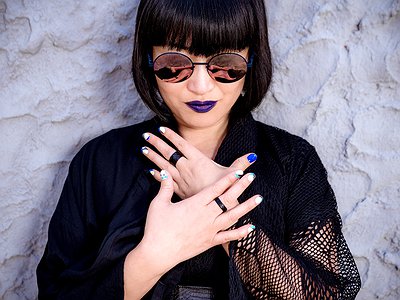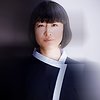Can you describe your state of mind during a DJ set? What supports this ideal state of mind and what are distractions? Are there strategies to enter into this state more easily?
I prefer to be able to see the people. I was once playing in Rio de Janeiro and I was standing really high in the room. It was so high, in fact, that it felt too remote to me. I like small capacities and small venues. I prefer that the people and me are on the same level and that we can see each other. The venues for Enter.Sake were, I think 500-600 people. I guess that's still okay, but even in these places, I was standing very high, so you have to go up on a terrace. It's nice if the people can see you like that, but I don't enjoy the feeling … I don't command the people.
We do it together. That, I think, is one of the concepts of my DJing.
Distractions? Maybe too many requests (laughs). It doesn't happen all the time, though. I can't communicate that much anymore, because very often, I need to – and prefer to - concentrate on my set times.
What are some of the considerations that go into deciding which track to play next? What makes two tracks a good fit? How far do you tend to plan ahead during a set?
For me, selection is not that difficult. I know exactly what I'll play next, automatically, unconsciously. I just do it by coincidence. Maybe I'll pre-determine the intro and outro. But other than that, there is no system. When I'm playing out, I'm not thinking too much about who is there or whether they specifically came to see me or not. I don't really look at what they're doing, either. Instead, I concentrate on my beat, or on something else entirely. I turn into an empty vessel. I am not conscious of these things.
I make hard cuts sometimes, because it can be very effective. When you're dancing to techno, most of the time you follow this hard bassline. So sometimes, I will put in a hard cut to something minimal or completely different. This is something highly functional, especially if I feel I've done a bad match, I will use this to take a different direction to make the atmosphere more interesting.
How would you describe the relationship between your choices and goals as a DJ and the expectations, desires and feedback of the audience? How does this relationship manifest itself during a performance and how do you concretely tap into it?
These decisions, for me, are similar to the question which kind of clothes you're going to wear today. If you're going out into the mountain, you're not going to wear a suit. And similarly, there is always some concept for the night. What matters is that, basically, you celebrate. And the music is there to facilitate that celebration. I don't want to bring some aggression or negativity. After all, in their daily lives, many people already have very deep personal problems. So I don't want to create problems with my DJ set.
If people do come especially to hear me, I will play more of my signature style. Whereas, if there's more of a distance with the people, I combine it more with some more 'understandable' music, maybe in the vein of Enter.Ibiza.
Some producers will sometimes come up to me and present me their tracks on the night. And if the night is going really well, I will listen to them in between two pieces. And if I feel like it, I will play that tune, in front of this crowd. That's not something I would do at a big festival, but maybe at a local club. Why not? People enjoy it and if I include a piece by this producer, I'll make him happy. This also comes from the fact that I'm not a producer myself. I'm using somebody else's tracks to play and I want to encourage people to create.
It also carries the message that for this night, you're a family.
Yes. Why are there so many languages and cultures in the world? Why is there so much hate and war? These are long-time questions that keep me busy. I'd already been traveling a lot of countries before I became an international DJ. For example, I'd been to Europe, the USA and Egypt or India with my father when I was a teenager. So I've seen many different cultures as a child. And a club is a really interesting place. It shows everything. It's like the news. It shows you which style is current right now, what kind of people are living in this city or village. A doctor or a pilot or a student or someone without a job, they're all on the same level, more or less, for the night, having a drink and meeting. So it's an amazing place to meet and share and enjoy. That's why it's so important, as I said before, for me not to create a war or a fight with my sets. Instead, I'll ask myself what I can do for these people, for this city. DJing is like praying for me.
The energy for a good night depends not just on the DJs, but the people as well. If the people already had a good party the night before and they're tired now, it's not my fault (laughs). What is also interesting is that I have now visited many different countries. Take a country like Greece, which has many financial problems. Or countries from the East of Europe, which are poorer. They have more energy than for example people in the USA! In the USA, they're very passive kids. They have everything. If you go to the supermarket, everything is taken care of for you. It's the same in Japan: You pay and then you get something for it in return. So you don't know how to create yourself. And you're not hungry. The less opportunities people have, the more energy they'll have.
You said that you still feel as though beatmatching is a challenge. Does that mean you have a sort of a standard you want to meet? I guess there is a balance between getting things perfect and being spontaneous.
When I listen to other DJs, they're all very constant. And when I sometimes listen to my own recordings, I feel that the volume level is a bit different … or I'll do the beatmatching on the headphones, but I can't really get it right. So then, there'll be a little bit of a gap and it will take another ten seconds or so before you get a good match. But to me, that's normal. It's not about practising.
What is it about?
I think you need to really remember the songs. That is what's really important for me. But of course, there are so many tracks. So you can not always remember which track is which and on which side of a record it is. So I'll make a mark in the following way: A red mark will indicate 'up', like more power or energy. And a blue mark will indicate something more ambient or deep. So this system is really easy for me to understand. When a track ends, I can choose to go for red or something more blue. I just have to feel the atmosphere a bit. This is a great help for me, since there are just too many tracks. With some people, like Richie Hawtin or Paco Osuna, I remember. But with many of the others … Again, let me use a comparison from clothing. Are you going to wear a longsleeve or shortsleeve? A t-shirt or a sweater? You select which category you want. And then you pick it up.
I read an interview with Richie Hawtin, where he said that his team will sometimes select tracks for him to play on a night which he will not have heard before. It must be very interesting to play that way.
I sometimes do that, too! I may have bought a record, but didn't have the time to listen to it in full. I will just have heard parts, but it will be enough for me to know which record is for me and which one isn't. It has more of an element of surprise that way and it's more interesting to play that way – to listen to the music for the first time together with the audience.
Other than closing time, what marks the end of a DJ performance for you? What are the most satisfying conclusions to a set?
No beats. My ending track is by Jeff Mills. It's called "The Hunted". I always play this one. He released it fairly recently and it's very spacey. If you're closing the night, it provides some ambient vibes. It also makes for a good fit to dedicate it to the next DJ – who can do whatever he wants from there. It's a collaboration with the other DJs, too, after all, it's not just my night. It's a community.
[Read our Jeff Mills interview]



